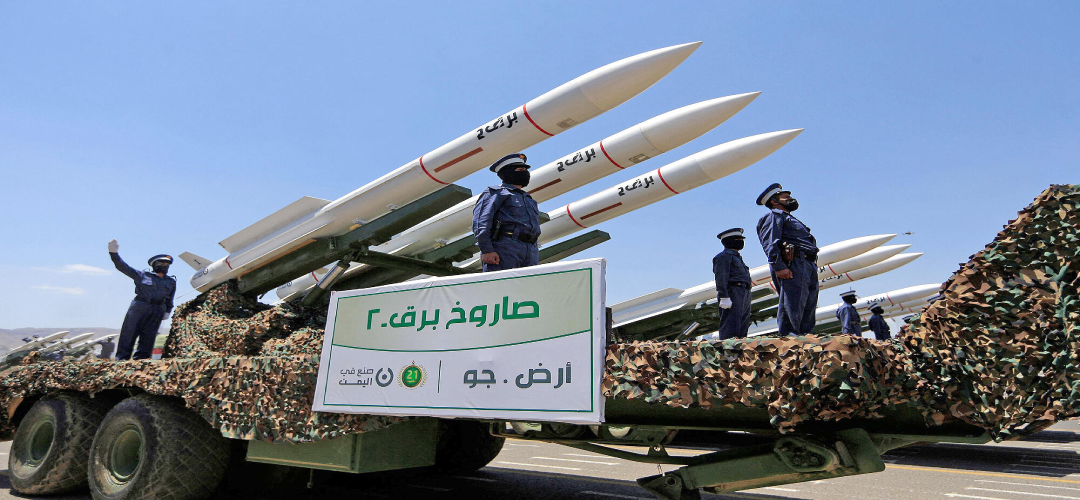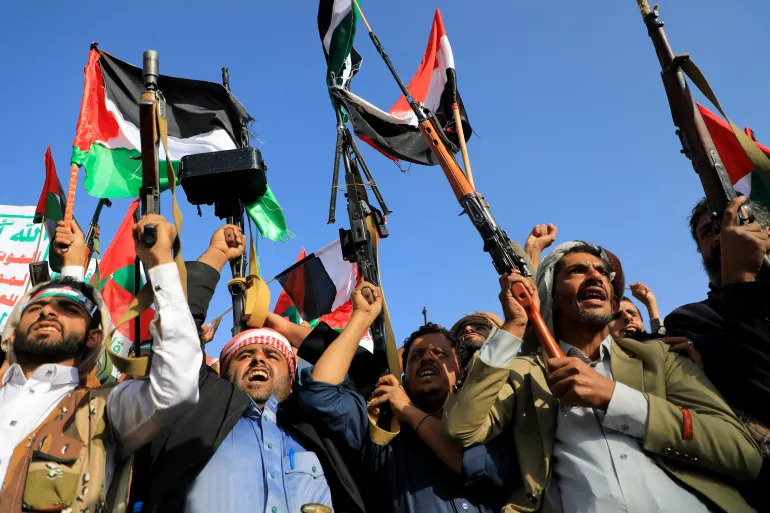Gaza War: The Houthi Factor
December 2, 2023 | Expert Insights

Post-October 7th, as a revengeful Israeli Defence Forces (IDF) struck back at Hamas in the Gaza Strip, a storm of angry protest arose from the Arab and Muslim world. Many global analysts predicted an enlargement of the Gaza conflict as Israel's Arab neighbours, Hezbollah and the Syrians especially, were expected to join their Hamas comrades in arms. Nothing of the sort happened as the war approached its second month, barring a few isolated intrusions and standoff missile firing by the Hezbollah in the North.
Under threat of an American strike from powerful carrier groups loitering in the Mediterranean and the Red Sea, Iran kept the Hezbollah on a tight leash.
However, the impulsive Houthi militants, another of the numerous Iran-sponsored militias, joined in the fray, firing salvos of long-range missiles and drones over the Red Sea into Israel. Making little headway in this enterprise, as the powerful American naval groups in the Red Sea made short work of these crude missiles, the Houthis have now escalated into economic warfare.
Background
On November 18, 2023, the Rawabi set sail from Oman en route to India. The following morning, Houthi fighters intercepted the vessel in the Red Sea using two speedboats, firing warning shots that forced the cargo ship to a halt. Armed Houthi militants then boarded the Rawabi, landing on the deck from a hovering MI-17 helicopter, taking control of the multinational crew on board. Rawabi is owned by a British company and operated by a Japanese firm. The Houthis claim that the real owners are Israelis.
This brings back memories of the ‘Tanker War' waged by Iran against neutral shipping suspected of supplying Iraq in the Persian Gulf and Strait of Hormuz from 1984 to 1988. This is hardly surprising, considering the Houthis are considered to be nothing more than an Iranian front in the civil war in Yemen. The incident has thrust the Red Sea into the global spotlight, raising concerns about maritime security, geopolitical tensions, and the ongoing conflict in Yemen.
Houthi spokesperson attributed the seizure to Israel's alleged actions against Palestinians in Gaza and the West Bank. They claimed the Rawabi was "Israeli-linked" and transporting "illegal cargo" to Israel. Israel vehemently denied any connection, condemning the Houthi actions as piracy. The United States and other nations echoed these sentiments, calling for the immediate release of the ship and its crew.
On November 20, the Houthis released a video depicting the Rawabi's crew, seemingly in good health, reiterating their demand for the release of Yemeni prisoners held by Saudi Arabia and its allies in exchange for the Rawabi and its crew. The International Maritime Organization (IMO) condemned the Rawabi's seizure on November 21, expressing concern about the safety of the ship's crew. As of November 22, there have been no further updates on the Rawabi or the condition of its crew.

Analysis
The Rawabi's seizure marks a departure from historical incidents in the Red Sea primarily attributed to Somali-based piracy. With over 10,000 annual transits, the Red Sea stands as one of the world's busiest shipping lanes, and any disruptions to maritime navigation carry significant economic consequences globally. The Houthi rebels' decision to seize a cargo ship introduces a new layer of complexity to an already volatile situation in Yemen and the broader Middle East.
The international community faces the challenge of balancing responses to maritime security threats with the imperative of finding a comprehensive resolution to the multifaceted conflict in Yemen.
The ominous silence surrounding the Rawabi and the fate of its crew deepens the uncertainty surrounding this unfolding crisis. As concerns persist over maritime security and regional stability, all stakeholders must exercise restraint and avoid actions that may further escalate tensions. The international community must actively promote diplomatic dialogue to secure the safe release of the Rawabi and its crew. The coming days will be crucial in determining the trajectory of this evolving crisis and its broader implications for the geopolitical landscape.
The seizure of the Rawabi has significantly heightened tensions between the Houthis and Israel, as well as further strained relations between Iran and its allies against Saudi Arabia and its allies. This escalation raises concerns about the potential for a broader conflict involving Iran and its regional partners. The Houthis' actions are perceived as a deliberate provocation, potentially aimed at eliciting a response from Israel.
That Teheran gave the green light for this cannot be ruled out. Analysts speculate that Iran may exploit the incident as a pretext to increase its influence in Yemen and the broader Middle East. Given Iran's history of supporting proxy groups in the region, the Rawabi seizure may serve as an opportunity for the nation to assert its geopolitical influence.
The impact on ongoing efforts to resolve the Yemen conflict is a significant concern. The Houthis' actions could obstruct diplomatic engagement with the international community. The incident signals a potential reluctance on the part of the Houthis to engage in negotiations, posing challenges for organizations like the United Nations and other mediators attempting to broker a peace deal. The potential for a wider escalation of violence in the region is a looming threat.
If Israel were to retaliate against the Houthis, it could trigger a cycle of violence that extends beyond the immediate parties involved, engulfing the entire Middle East.
Assessment
- The seizure of the Rawabi represents a grave development that intensifies the already precarious situation in Yemen and the wider Middle East. The international community faces an increasingly challenging task in working towards a peaceful resolution to the Yemeni conflict, with the Houthis' actions further complicating diplomatic efforts.
- The geopolitical implications of the Rawabi seizure extend to potential damage in relations between Iran and its allies against Saudi Arabia and its allies. Furthermore, it may lead to an escalation of sanctions against the Houthis and could impede the United Nations' ability to deliver essential humanitarian aid to Yemen.
- It is essential to recognize that these are only some potential consequences, and the fluid nature of the situation makes it difficult to predict the long-term impact of the incident.








Comments